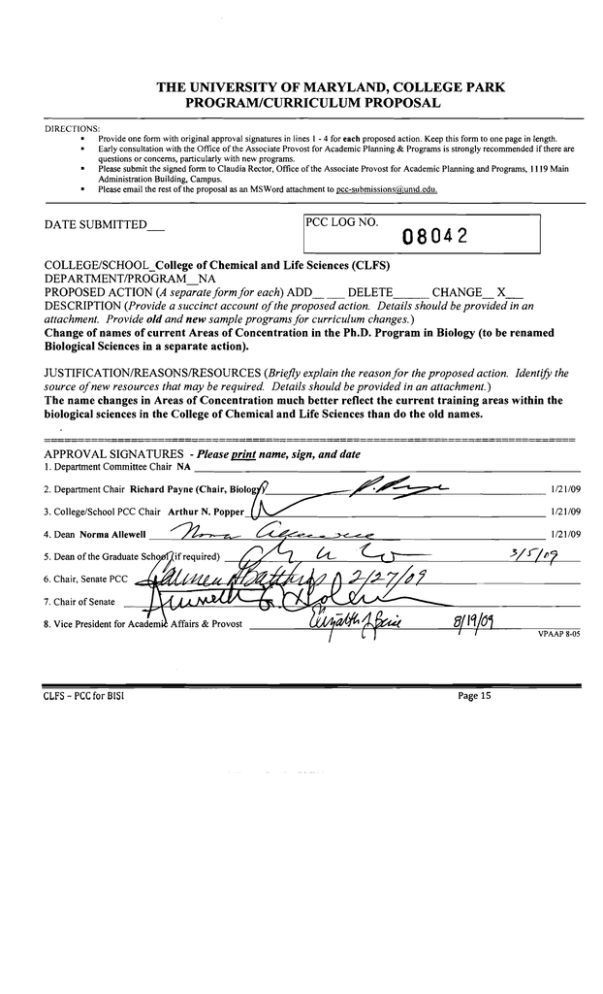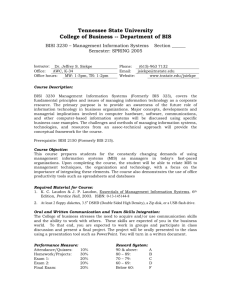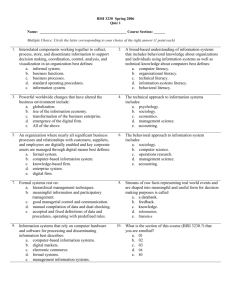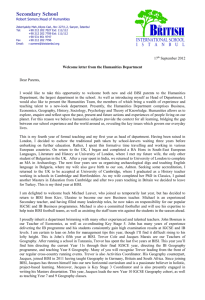THE UNIVERSITY OF MARYLAND, COLLEGE PARK PROGRAM/CURRICULUM PROPOSAL
advertisement

THE UNIVERSITY OF MARYLAND, COLLEGE PARK PROGRAM/CURRICULUM PROPOSAL DIRECTIONS: Provide one form with original approval signatures in lines I - 4 for each proposed action. Keep this form to one page in length. Early consultation with the Office of the Associate Provost for Academic Planning & Programs is strongly recommended if there are questions or concerns, particularly with new programs. • Please submit the signed form to Claudia Rector, Office of the Associate Provost for Academic Planning and Programs, 1119 Main Administration Building, Campus. • Please email the rest ofthe proposal as an MSWord attachment to pcc-submissions(iv,umd.edu. DATE SUBMITTED IPCC LOG NO. 08042 _ _ _ _ _ _ _ _ _ _ _ _ _ _ _ _ _ _---J COLLEGE/SCHOOL_College of Chemical and Life Sciences (CLFS) DEPARTMENTIPROGRAM NA PROPOSED ACTION (A separate form for each) ADD DELETE CHANGE_ X_ DESCRIPTION (Provide a succinct account ofthe proposed action. Details should be provided in an attachment. Provide old and new sample programs for curriculum changes.) Change of names of current Areas of Concentration in the Ph.D. Program in Biology (to be renamed Biological Sciences in a separate action). JUSTIFICATION/REASONS/RESOURCES (Briefly explain the reasonfor the proposed action. Identify the source ofnew resources that may be required. Details should be provided in an attachment.) The name changes in Areas of Concentration much better reflect the current training areas within the biological sciences in the College of Chemical and Life Sciences than do the old names. =============================================================================== APPROVAL SIGNATURES - Please print name, sign, and date 1. Department Committee Chair NA _ 2. Departmeo' Cha;, Riehord Payne (Chair, 3. College/School PCC Chair Arthur N. 4. Dean Norma Allewell BiOIO~ --=~;:::::;---""'- popper~""_::.....---------------------~--__~ '121/09 1/21/09 1/21/09 6. Chair, Senate PCC 7. Chair of Senate VPAAP 8-05 CLFS - PCC for 8151 Page 15 I. PURPOSE OF PROPOSAL This proposal changes the names of existing Areas of Concentration in the Ph.D. in Biology (to be renamed as the Ph.D. in Biological Sciences in a separate action) to better reflect Areas of Concentration that are emphasized in the College of Chemical and Life Sciences, and the training and research interests of our faculty. While the overall themes of the new names for Areas of Concentration are similar to those of the old names, the new names far better reflect 21st century biological sciences, and the strengths of CLFS. The following current Biology Areas of Concentration will be changed as follows: 1. “Ecology” to “Behavior, Ecology, Evolution, and Systematics” 2. “Cell Biology” to “Molecular and Cellular Biology” 3. “Systematics and Evolutionary Biology” to “Computational Biology, Bioinformatics, and Genomics” II. CHARACTERISTICS OF THE PROPOSED PROGRAM Educational Objectives The educational objectives for the proposed changes are no different from those of our current graduate programs – to provide for the best possible training for doctoral students in the biological sciences. Brief Catalog Description – The Biological Sciences graduate program (BISI) offers a wide range of research and training opportunities for students who are interested in pursuing doctorallevel research in very diverse areas within the biological sciences. Faculty research interests extend from molecules to ecosystems, and include all intermediate levels of organization. Research approaches extend from the most modern approaches for studying molecules to sophisticated methods for examining global-scale climate change. Research takes place within the laboratories of faculty in the departments in the College of Chemical and Life Sciences, as well as in laboratories of participating faculty in other colleges and institutes of the University of Maryland. In addition, students have the opportunity to work with participating faculty from near-by research institutions such as the National Institutes of Health, Smithsonian Institution, and Beltsville Agricultural Research Center. The goal of BISI is to enable students to obtain the best training in their intended research areas, and to work with outstanding faculty. More information can be found at www.chemlife.umd.edu/BiSci/. General Requirements for the Ph.D. Degree Each student will generally be part of, and advised through, one of the BISI Areas of Concentration (CA). Students with interests that overlap Areas of Concentration, or do not fit into a regular Area, will be initially will be advised by a faculty member and committee appointed by the Program Director. Typically, course requirements are completed within two years of starting Ph.D. study. CLFS – PCC for BISI Page 16 Before the end of the second semester in BISI, the Ph.D. student should select a dissertation advisor, and by the end of the fourth semester, the student and advisor should select the other faculty members who will serve as the student's Research Committee. The student's research advisor serves as the chair of this committee, and it becomes the responsibility of the committee to guide the student through the remainder of the graduate program. All Ph.D. students will be required to complete a minimum of 26 credits to meet degree requirements.1 This will include a minimum of 9 credits of advanced course work, 3 credits of graduate seminars, a 2-credit Professional Development seminar, and at least 12 credits of 899 Doctoral Dissertation Research. Specific course/credit requirements, including additional credit requirements and the courses that are to be included within the advanced courses, may be established by the individual Areas of Concentration. Each student will have yearly meetings with her/his advisory committee for advising and for examinations. By the end of the student’s third year in BISI, she/he will present a research proposal to the committee that will summarize the relevant literature, objectives, experimental methods, and significance of a research project that the student and the advisor believe is appropriate for a Ph.D. dissertation. This meeting, which is held no later than by the end of the student's sixth semester, is chaired by the student's advisor and is attended by all members of the research committee. During the meeting, the student is examined on the research proposal. Passing the exam will allow the student to advance to doctoral candidacy. The ability to do independent research must be demonstrated as well by an original dissertation which must be successfully defended before an examining committee in order for the student to fulfill the degree requirements. Students are required to present a public seminar during the semester in which they intend to hold the defense. Proposed Changes in Program Name – Name changes in Areas of Concentration, as described in Section I above. Proposed Changes in Area of Concentration Names – As listed above. Requirements of Each Area of Concentration ♦ Each Area of Concentration will focus on distinctly different areas of the biological sciences. ♦ With rare exception, there is no need to develop new courses (Table 1, page 20) for the Ph.D. degree. The exception may be in the area of Computational Biology, Bioinformatics, and Genomics where there may be the need for a general overview course. But, this has yet to be determined. If developed, it will be through reassignment of faculty currently teaching courses with low graduate enrollments. ♦ All current CLFS graduate courses will be offered under the BISI rubric. ♦ While each Area of Concentration has its own group of courses, it will be common for students to take courses across areas, depending on the specific scholarly interests of the student. Thus, since students in the BEES Area of Concentration may be incorporating topics as 1 At the same time, policies will be in place to allow exceptions to required courses, such as for students who enter the programs having already had similar courses in other (UMD or non-UMD) programs. CLFS – PCC for BISI Page 17 diverse as genomics and development in their dissertation research, the students may very well include courses in those areas as part of their program. Indeed, this overlap reflects the complexity of modern biology, and is encouraged to develop the most broadly trained students. ♦ Courses for each Area of Concentration are shown in Table 1 (page 20). As demonstrated in the Table, each Area of Concentration has a unique set of courses from which students may choose after discussion with their mentor and advisory committee. In some cases, Areas of Concentration may stipulate that one or more of these courses are required of every student in that area. ♦ It is expected that the number of courses required in any Area of Concentration will not exceed current requirements for comparable programs. Thus, changes in course requirements will not change the time to degree. Moreover, current students who choose to move to the new BISI structure to complete their degrees will not have additional courses/requirements imposed upon them.2 At the same time, it should be noted that the most important differences between Areas of Concentration is not in course requirements or expectations, but in the nature of the research training that students receive, the seminars they attend, the meetings they go to, and the collaborations they develop with their faculty. In effect, at least in the biological sciences, who a student ultimately becomes evolves from her/his community, and the Areas of Concentration represent those communities. Learning Outcome Assessment CLFS has been very successful in developing Learning Outcome Assessment tools for its graduate programs. The LOA for the proposed Biological Sciences graduate program is found in Table 2 (page 21). Library Requirements - No additional library requirements are needed. BISI continues to serve the same faculty and student pool as in the past, and the library needs will not change (though we, of course, would like to see an increase in library holdings in biological sciences, this is not needed to initiate or maintain BISI). BISI Faculty – No change from current faculty. BISI Courses – It is recognized that while courses are needed by the Areas of Concentration, faculty time and teaching obligations are controlled by the departments. In fact, this is not a new issue since we have had courses in several of the current areas (e.g., BEES, MOCB) for many years, and there has never been a “conflict” between faculty teaching departmental vs. program courses. Indeed, since faculty members normally teach at least one graduate course each year, their teaching would naturally be in BISI courses. Most importantly, however, our experience has been that since our Chairs have a “stake” in the graduate programs, and that they work hard to ensure that faculty are able to teach the needed graduate courses. Moreover, since the BISI Director will meet regularly with the Chairs (see organization chart, page 12), any issues arising 2 Status of current students in BISI is discussed in detail in the PCC document suspending several programs – see page 26. CLFS – PCC for BISI Page 18 will be easily and collegially dealt with (as they have in the past). Resources Required - No additional resources are required for BISI. Current staff support will become BISI staff. The BISI Director will be a regular tenured faculty member in CLFS, as will be the Concentration Area Directors. Indeed, fewer program directors will be needed under BISI than are needed in current programs. BISI Admissions One of the critical features of the BISI is that we will now have a single “face” for all graduate programs in the Biological Sciences on the web and in print. Students potentially interested in doing graduate work at UMD in the biological sciences (and related fields) will see a single home page that will have search engines designed to help them not only find potential mentors with interests similar to their own, but also to find the appropriate program at UMD to which they would make their application. Assuming that the student was interested in programs within Biological Sciences, they would be directed to the appropriate Area of Concentration. Applications for admissions would be made through the common portal to the Graduate School’s online application system, and the program admissions office would manage applications. Actual decisions on students would be made by the Area of Concentration that is most appropriate for the student’s interests. Once the Concentration Area committees have recommendations for admissions, the BISI admissions committee would make final decisions based on student ranking by the Areas of Concentration, and provide financial support for incoming students.3 It is policy in CLFS that no doctoral student is admitted without guarantee of financial support (e.g., TA, fellowship, research assistantship), typically for five years in biology programs. A critical part of this process is that we will invite related programs that are not within BISI, such as CONS, Entomology, NACS, MEES, and Biophysics, to participate in our home page and be part of our search engine. This will help students find the faculty and graduate programs that most fit their needs. While it is possible that a student will choose to go to one of our partner programs rather than BISI, one of our goals with the common portal is to bring the very best graduate students to UMD in the broad areas of the biological sciences, and our view is that the most important thing is to get excellent students to come to UM, no matter where they wind up. 3 Using currently available funds. CLFS – PCC for BISI Page 19 Table 1: Courses for each Area of Concentration. The specific courses a student takes will be decided upon by the faculty in the Areas of Concentration and by the students individual advisory committee. CA – Behavior, Ecology, Evolution, and Systematics Course # Title Credits Introduction to BEES 608 1 BEES Genetic Adaptive 2 BIOL 608 Evolution BEES 609 Paleobiology 2 BIOL 608 Behavior Ecology BIOL 608 Invasions & Invasive BIOL 608 BIOL 608 BIOL 608 BIOL 608 BIOL 608 BIOL 662 BIOL 665 Evolution of Regeneration Adv Theoretical Ecology Concepts In Animal Ecology Behavioral Ecology BIOL 671 Molecular Evolution BIOL 760 BIOL 608 Evolution & Development Marine Ecology & Evolution Molecular Ecology Plant Population Biology Behavioral Evolution CA – Computational Biology, Bioinformatics, and Genomics Course # Title Credits CA – Molecular and Cellular Biology Course # Title Credits BIOL 708 Genetics & Genome Data 4 CBMG 688 Genetics: Research Exp 3 BIOL 608 Human Evol Genetics 2 CBMG 688 Microbial Pathogenesis 2 CBMG 688 2 CBMG 688 Cell Biology I 2 2 CBMG 688 2 CBMG 688 Cell Biology II 2 2 CBMG 688 2 CBMG 688 Genetics: Cell Bio II 2 2 CBMG 688 Genetics II General Bioinformatics: Comp Meth Grad Bioinformatics: Comp Meth Bioinformatics And Molecular Systems 3 CBMG 688 Gen I:Gene Expression 2 2 CBMG 688 Comp Bioinformatics 3 CBMG 688 Genetics I: Gene Exp 2 2 CBMG 699 Bioinformatics & Comp Bio 1 CBMG 688 2 CBMG 699 Bioinformatics & Computational Biology 1 CBMG 688 2 CBMG 688 Genetics: Plant I 2 CBMG 688 4 CBMG 699 Eukaryotic Model Systems 1 CBMG 688 4 CBMG 699 1 CBMG 688 3 CMCS 828N 3 CBMG 688 Developmental Biology 2 3 CMCS 858L 3 CBMG 688 Principles Of Microscopy 2 2 CMCS 858E Genetics Eukaryotic Syst Computational Gene Finding And Genome Assembly Graphs And Networks In Computational Biology Algorithms For Biosequence Analysis Plant I Development & Physiology Plant II: Dev And Phys 3 CBMG 688 Molecular Virology 2 NACS 644 BIOL 622 BSCI 651 CLFS – PCC for BISI Page 20 Immunology & Host Defense – Part 1 Immunology & Host Defense – Part 2 Microbial Genetics Cellular & Molecular Neuroscience Biophysics for Biologists Membrane Transport Phenomena 2 2 2 2 1 3 3 TABLE 3:ASSESSMENT PLAN BIOLOGICAL SCIENCES (BISI)/PH.D. (Program of Study / Major / Degree Level, etc.) Program Contact: Phone: E-mail: _____________ Date submitted to Academic Unit Head: Program Goals: The goals of BISI are to provide access to world-class research facilities, facilitate communication and collaboration among faculty and students, and provide an incomparable environment for training independent scientists such that they are able to make significant contributions to the fields of behavioral, ecological, evolutionary and systematic biology. Relevance of goals to the mission statements and/or strategic plans of the University, College, or Program as applicable: Student Learning Outcomes Assessment Measures and Criteria Assessment Schedule (list the three-to-five most important) (describe one or more measures for each outcome and criteria for success) (initial year, and subsequent cycle) 1. General knowledge of biological sciences topics sufficient to support their dissertation research. General knowledge will be assessed in an oral preliminary exam. 2010, yearly Students will demonstrate knowledge in five key areas of biological sciences content, identified by their preliminary exam committee. Three of the key areas will represent the three required areas chosen by the student and their committee for general study in the graduate program. Students obtain general knowledge from course work and from independent reading, but general knowledge assessment will take place in an oral preliminary exam, usually completed by the end of the student’s second year in BISI. The specific areas of knowledge required for each student will vary depending upon the input of the preliminary qualifying exam committee, but will include at least three of the five core areas agreed upon by the BISI faculty. Measure Each member of the preliminary exam committee for a student will rate the general knowledge proficiency exhibited during the exam. Each student’s general knowledge will be rated as excellent, adequate, or unacceptable. Every student’s general knowledge proficiency will be included in the LOA analysis. The results from all rating sheets for each student will be compiled in a spreadsheet. To summarize the ratings for each student the median rating will be used. CLFS – PCC for BISI Page 21 The goal of the program is for: 2. Ability to plan a research program in the biological sciences Students will demonstrate the ability to plan a research program by formulating a problem for their dissertation topic, develop a research plan to address this problem and communicate this topic and plan to a technical audience. This is accomplished through completion of a written preliminary exam proposal, an oral presentation of the research plan, and defense of the research proposal in the preliminary exam. This is generally accomplished by the end of the third year in BISI. Criteria 10% or fewer students have a median rating of unacceptable. 90% or more students have a median rating of at least adequate 25% or more students have a rating of excellent. If these criteria are not met the BISI faculty will determine measures to improve general knowledge of BISI students. These might include: Changing the content of key BISI courses Being more explicit about the expectations of the prelim exam Providing more explicit direction in independent readings that students can utilize to learn general knowledge. The ability of students to plan a research program in the biological sciences will be assessed in two venues: a written research proposal and during the oral preliminary exam. Measures. Both the written research proposal and the oral preliminary exam for each student will be assessed by each member of the preliminary exam committee. Ratings will be made in the following areas on the research proposal: Background Literature Research Problem Methods Significance Feasibility Student performance on each will be rated as excellent, adequate, or unacceptable. The results from all rating sheets for each student will be compiled in a spreadsheet. To summarize the ratings for each student the median rating will be used. Criteria: The goal of the program is for: 10% or fewer students have a median rating of unacceptable. 90% or more students have a median rating of at least adequate 25% or more students have a rating of excellent. CLFS – PCC for BISI Page 22 2006, yearly 3. Students demonstrate the ability to implement and complete independent scientific research. The research conducted is summarized in a dissertation and presented in a professional manner in front of a public audience. 4. Students make significant scholarly contributions to the field. Measures: Assessment of the oral public seminar and the written dissertation will be judged on the following criteria: Background Literature Research Problem Methods Significance of Research Conclusions Future Directions Student performance on each will be rated as excellent, adequate, or unacceptable. The results from all rating sheets for each student will be compiled in a spreadsheet. To summarize the ratings for each student the median rating will be used. Criteria: The goal of the program is for: 10% or fewer students have a median rating of unacceptable. 90% or more students have a median rating of at least adequate 25% or more students have a rating of excellent. Measure: Number of publications and presentations authored by students. Criteria: By the end of the program for each cohort, 80% of Ph.D. graduates will publish at least two articles in a refereed journal and make at least one presentation at a national conference. CLFS – PCC for BISI Page 23 2006, yearly 2006, yearly







